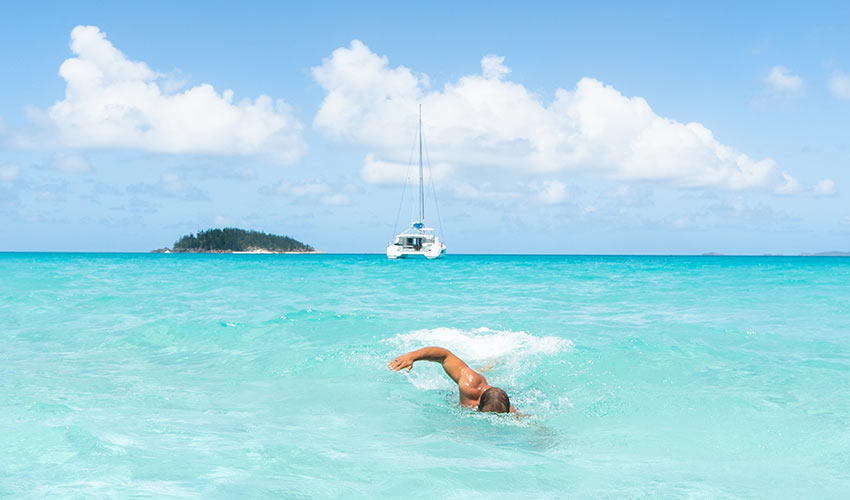Health Benefits of Sea Swimming
Swimming in the oceans, swimming in the seven seas, the blazing sun's kiss, the salt water bliss, whenever I'm in those sparkling blue waters it's simply freedom and bliss. I've swam in a lot of seas, my favourite being in Raja Ampat Indonesia, all about that destination another time. For now I'm going to share why I think Sea Swimming is so good and use my old notes on the many benefits. The sea helps us return to who we are, it's unapologetic, rebellious, and deep blue, we have to keep our wits about us but also feel the healing. ''I bathed in its depths, tide after tide, as the sea whispered truths, it had nowhere to hide.'' If you like to read more of my poems, I sometimes publish them on our Instagram page. Swimming in sea water is therapeutic for the body not only because of its physical benefits but also for its psychological effects. Its unique combination of buoyancy, saltwater and waves has been known to assist in promoting health and well-being.
We all know swimming is a popular activity enjoyed by millions of people worldwide. But the point is here why we want to all choose the Sea over indoor and outdoor swimming pools. Let me get straight into the awful truth of these pools. Swimming pools use chlorine to disinfect and kill harmful bacteria in the water. However, prolonged exposure to chlorine can lead to skin and eye irritation, dryness, and respiratory issues. It can also cause hair to become brittle and lose its shine. When chlorine interacts with organic substances, such as sweat, urine, and body oils, it can form harmful byproducts called chloramines. These chloramines contribute to the strong chlorine smell around pools and can cause respiratory problems and irritation. When chlorine reacts with organic matter in the water, it can create disinfection byproducts. Some common DBPs include trihalomethanes and haloacetic acids, which are known to be potentially carcinogenic and have been linked to various health issues. While chlorine is effective in killing most harmful bacteria, it may not eliminate all of them. Cryptosporidium, for example, is a parasite that is chlorine-resistant and can cause severe gastrointestinal illnesses if swallowed. Another thing I thought of that is never mentioned, they're not safe to walk around. Pool decks and surrounding areas are slippery, increasing the risk of slip and fall accidents, which may lead to injuries. Public swimming pools, especially during peak seasons, can become crowded and unsanitary. When too many people share the same pool, it increases the risk of spreading waterborne illnesses, such as stomach viruses and skin infections. Surely that will convince you to stick to the sea, so now I'll explain the amazing benefits.

Swimming in the sea, brings with it a whole host of benefits that are not found at all in man made swimming pools. Swimming in the sea is not just relaxing and fun, but it also has many benefits for us. It will bring numerous benefits to your physical and mental wellbeing, further immersing you in nature. With its vast beauty and tranquillity come enhanced natural properties that are impossible to find in alternative pool swimming activities. Try swimming for longer durations each week for optimal benefits. It's worth also mentioning we can use Celtic Sea Salt on our hair, skin, use for hydration and in filtered drinking water to get some benefits when away from the sea. The sea is rich in minerals such as magnesium, potassium, and calcium, which can have positive effects on the health of your skin, hair and joints and mobility. So much! So, I've written extended info on the both of these benefits.
Improved Circulation & Recovery
Cold sea water can help to improve blood circulation in the body. The combination of swimming with the icy seawater encourages the blood vessels to constrict, which, in turn, promotes stronger blood flow around the body. Swimming in the sea can also aid in recovering from injuries. The cold temperature of the water can reduce swelling and inflammation and ease stiff muscles and joints.
Boosts the Immune System
Swimming in the sea is linked to several health-protective, immune-supportive properties. The high mineral content from the ocean and exposure to salt can act as an immune booster. The sea is rich in nutrients, such as iodine and vitamin D, which are known to support immune function.
Improvement in Breathing
The deep breathing techniques required for sea swimming make it an excellent cardiovascular exercise. Deep breathing exercises promote relaxation and can help increase lung capacity over time.
Reduces Stress
The sound of waves hitting the shore, combined with the silent and serene underwater world, is believed to have a therapeutic effect on the brain. Emotional and physical stress can both be reduced by spending time in the sea.
Natural Exfoliant & Skin Toner
Ocean water is rich in minerals and properties that nourish the skin, removing toxins and debris from the skin’s surface. Swimming in the sea can be a natural remedy to exfoliate dead skin cells, tone the skin, and promote greater skin hydration.
Mental Health Benefits
Swimming in the sea can reduce anxiety, depression, and calm the mind. Sea swimming encourages you to escape your routine, where your mind disconnects from traditional problems, helping you find clarity and calmness in other aspects of your life.

Hair, Skin & Beauty
One of the major benefits of swimming in the sea is that it helps to detoxify your skin. The salt water has a natural exfoliating effect, as it removes dead skin cells and unclogs pores, leaving your pores fresh and clean. Additionally, the warm temperature of the water helps to increase circulation, which means that your skin will be able to receive more oxygen and nutrients. Swimming in seawater is also believed to benefit the appearance of your skin. The uv rays present in seawater can work together with the vitamins in your skin, including vitamin D, to help reduce the appearance of wrinkles, acne, and other blemishes. Because of its high mineral content, seawater can also help to soothe and heal irritated skin, which makes it an excellent resource for people who suffer from eczema or psoriasis. The beauty benefits of swimming in the sea do not end at the skin's surface- they even help support healthy and luscious hair. Salt water contains ions that increase hair volume and promote hair growth. The natural ability to cleanse the pore by removing oil, dirt, and product buildup and soothes it makes salt water an excellent natural remedy for removing greasy or oily residues that usually clog follicles and cause hair fall. Zinc and magnesium found in ocean water can make hair stronger and less likely to break. Furthermore, salt water tends to naturally condition in a variety of ways as it helps to lock in moisture, which can make hair appear shinier, and help sustain naturally sublimely healthy counterparts. In short, swimming in the sea can produce an array of positive changes in your hair and skin. Mother Nature has laid her blessings right within our reach without any need for expensive products and maintenance. So, whether it's a casual swim or an "ocean cure" soak, feelings of rejuvenation are what we can expect bottom line. Prompting us to "sea more, feel better" to provide us a rewarding ocean experience packed with skin and nourishing hair benefits.
Sea Swimming for Joints & Mobility
Firstly, swimming in sea water helps provide low-impact exercise ideal for people with bone, joint, or chronic pain conditions because it is gentle on the body whilst still working the muscles. Due to buoyancy, individuals feel lighter, meaning pressure is taken off their joints. This can result in increased range of motion for those with limited movement. Unlike other forms of exercise such as running and weightlifting, swimming in sea water does not require the person to land any force when moving which means their bones, joints and muscles will not wear out easily over time. Additionally, the natural elements present in sea water can boost health benefits, enabling more profound advantages for people who choose it over other forms of exercise. For instance, saltwater has a therapeutic quality that can facilitate swelling reduction, relieve aches and pains, as well as soothe sore joints. Saltwater is also capable of pulling toxins from pores. While Human skin is naturally hydrophilic(which means it attracts water to itself) sea salt is hygroscopic.Therein, it releases moisture stored in your joints and muscles alongside contaminating "sticky" pollutants and exaggerates the production of natural joint lubricants and cellular turnover to support remodeling through proteolytic enzymes(carry cleaners and antistress pro¬tease to the stressed joints & tissues). Moreover, swimming in the sea involves dealing with waves, which appear naturally, making it an excellent way to improve balance and coordination. At sea, maintaining balance while trying to float and swim through waves offer an opportunity for maintaining and strengthening that stability required by joints.This is highly significant since It helps to resist some forces around the joints, assuming waves and responds effectively to keep balance. This, in turn, helps develop neuromuscular coordination) the ability a person has to send messages between their brain and muscle thereby maintaining equilibrium and inner stabilisation. Recreational swimming and beach combing involve fewer risks than other exercise activities providing you sign up more and equip yourself with to swim alongside wearing dental and hearing protective paraphernalia. A routine of lower-impact repetitions can work for you with cooperation with fitness and lifestyle changes, heal or increase your joint mobility leading to a more active and healthy life. So, the next time you have a chance to swim in salty water, utilise most of its therapeutic values, help your joint & tissue get their waves, gain necessary balance coordination and enjoy your time while getting healthy. Also do check out our Joint & Mobility Support supplement.






















